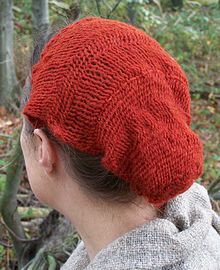
A hairnet, or sometimes simply a net or caul, is a small, often elasticised, fine net worn over long hair to hold it in place. It is worn to keep hair contained. A snood is similar, but a looser fit, and with a much coarser mesh and noticeably thicker yarn.
History
The oldest evidence of the hair net is from the 3300-year-old grave of a Danish girl dubbed the Egtved Girl; later examples are found in Ancient Greece

Hairnets were worn from the 13th century onwards in Germany and England, and are shown in illustrations from this period, often worn with a wimple. They were made from extremely fine silk, and edged with bands of either finger-weaving or tablet-weaving.
Uses
Food service workers often wear hairnets to prevent their hair from entering the food. Hairnets are part of normal attire for female horse riders, and are worn in most equestrian disciplines, including dressage, eventing, show jumping, and hunting. Organizations such as the Pony Club encourage their young members to become accustomed to wearing hairnets when around horses, not only to ensure a neat and elegant appearance, but also to eliminate any danger of scalping, should the rider fall off and the horse tread on loose hair.
Ballet dancers typically wear a bun at the crown of the head covered in a fine hairnet.
- Examples of hairnets
-
 Sketch of a hairnet
Sketch of a hairnet
-
 19th-century hairnet
19th-century hairnet
-
 19th-century woman with red hairnet
19th-century woman with red hairnet
-
 Foodservice hairnet
Foodservice hairnet
-
 Medical hairnet
Medical hairnet
In culture
Ena Sharples, a character in the UK soap opera Coronation Street between 1960 and 1980, was famous for wearing a hairnet; the original hairnet was brought in by the character's actress, Violet Carson, to stop the make-up women from altering her hair.
Female gang members in the United States and Mexico may wear hair coverings as part of their uniforms.
References
- Netting for Hairnets Susan Carroll-Clark, 1998.
- Danovich, Tove (21 December 2017). "How changing women's fashions gave us the hairnet—and shaped food safety law forever". The Counter. Retrieved 11 August 2021.
- How Are Gangs Identified? The Los Angeles Police Department. Retrieved: 2011-06-02.